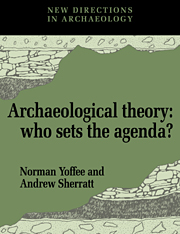Book contents
- Frontmatter
- Contents
- List of figures
- List of contributors
- Introduction: the sources of archaeological theory
- PART I THE SOCIAL CONTEXT OF ARCHAEOLOGICAL THEORY
- PART II ARCHAEOLOGICAL THEORY FROM THE PALAEOLITHIC TO THE STATE
- 4 Ancestors and agendas
- 5 After social evolution: a new archaeological agenda?
- 6 Too many chiefs? (or, Safe texts for the '90s)
- PART III CASE STUDIES IN ARCHAEOLOGICAL THEORY AND PRACTICE
- PART IV EPILOGUE
- Index
4 - Ancestors and agendas
Published online by Cambridge University Press: 03 May 2010
- Frontmatter
- Contents
- List of figures
- List of contributors
- Introduction: the sources of archaeological theory
- PART I THE SOCIAL CONTEXT OF ARCHAEOLOGICAL THEORY
- PART II ARCHAEOLOGICAL THEORY FROM THE PALAEOLITHIC TO THE STATE
- 4 Ancestors and agendas
- 5 After social evolution: a new archaeological agenda?
- 6 Too many chiefs? (or, Safe texts for the '90s)
- PART III CASE STUDIES IN ARCHAEOLOGICAL THEORY AND PRACTICE
- PART IV EPILOGUE
- Index
Summary
Introduction
Palaeolithic archaeologists do not often reflect on the history of their subject beyond examining the heroes who established human antiquity (Grayson 1983). In this paper I want to consider how the questions on today's palaeolithic agenda have been set. To do this I will need to go beyond the familiar accounts of the founding fathers of the subject and attempt to set them and the questions they posed in a broader cultural, political, and scientific context.
Disembedding concepts such as those relating to human origins is difficult but necessary if we are to advance our chosen subject. Historicizing the contexts of discovery and interpretation are all important, as many historians of science are now aware (Bowler 1986; Desmond 1982; Stocking 1987). This involves tracing both the overt and subtle undercurrents in the growth, acceptance, and rejection of ideas. The aim is to overturn what Gould (1988) has referred to as “cardboard histories” (of which archaeology has many examples) by recognizing the social, cultural, and political contexts within which science operates.
The risk is that many archaeologists will not accept such an endeavor. As hostile reaction to the World Archaeological Congress in 1986 showed, many palaeolithic specialists object to what they see as the politicization of the subject. They refer instead to the neutrality of scientific enquiry and the independence of academic thought about human origins.
- Type
- Chapter
- Information
- Archaeological TheoryWho Sets the Agenda?, pp. 39 - 52Publisher: Cambridge University PressPrint publication year: 1993
- 5
- Cited by

